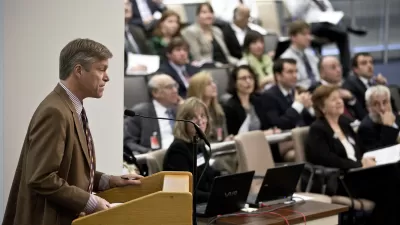The language we use as planners can serve many purposes and often hinders good communication rather than fostering it.

Daniel Herriges writes about planning’s use of "garbage language," the vague, confusing, jargon-filled language that is too often a part of corporate communications. "Sometimes, garbage language is a display of power. Sometimes it's a shibboleth, a form of in-group signaling. Sometimes it's a way of pre-empting and shutting down objections to something that, if described in plain terms, would be clearly objectionable."
In planning, garbage language is reflected in "aspirational buzzwords" that mean little in terms of tangible, measurable outcomes. This language can also mean very different things to different people, even as it is used to seemingly convey a universal notion. "The point of using livable is to stake a claim to moral authority, not to convince anyone or communicate anything. 'I’m for livability; you’re whatever kind of monster would be opposed to that,'" says Herriges.
Technical jargon can turn into garbage language when it is used to foster a sense of expertise that distances the public from the planning process. And in some cases, useful new terms are not part of the popular lexicon yet, and this can create barriers to inclusion, notes Herriges. "This is the difficulty in simply saying, ‘Jargon is bad and plainspoken language is good.’ Sometimes a highly specific, less known term actually conveys a specific meaning better than any other word could. This does, however, result in a learning curve."
FULL STORY: Does "Garbage Language" Infect How We Talk About Cities?

Maui's Vacation Rental Debate Turns Ugly
Verbal attacks, misinformation campaigns and fistfights plague a high-stakes debate to convert thousands of vacation rentals into long-term housing.

Planetizen Federal Action Tracker
A weekly monitor of how Trump’s orders and actions are impacting planners and planning in America.

In Urban Planning, AI Prompting Could be the New Design Thinking
Creativity has long been key to great urban design. What if we see AI as our new creative partner?

King County Supportive Housing Program Offers Hope for Unhoused Residents
The county is taking a ‘Housing First’ approach that prioritizes getting people into housing, then offering wraparound supportive services.

Researchers Use AI to Get Clearer Picture of US Housing
Analysts are using artificial intelligence to supercharge their research by allowing them to comb through data faster. Though these AI tools can be error prone, they save time and housing researchers are optimistic about the future.

Making Shared Micromobility More Inclusive
Cities and shared mobility system operators can do more to include people with disabilities in planning and operations, per a new report.
Urban Design for Planners 1: Software Tools
This six-course series explores essential urban design concepts using open source software and equips planners with the tools they need to participate fully in the urban design process.
Planning for Universal Design
Learn the tools for implementing Universal Design in planning regulations.
planning NEXT
Appalachian Highlands Housing Partners
Mpact (founded as Rail~Volution)
City of Camden Redevelopment Agency
City of Astoria
City of Portland
City of Laramie




























